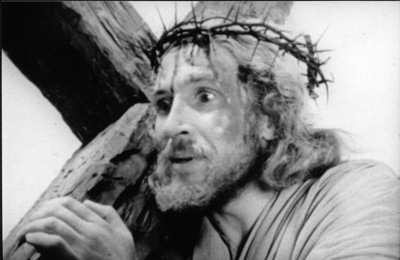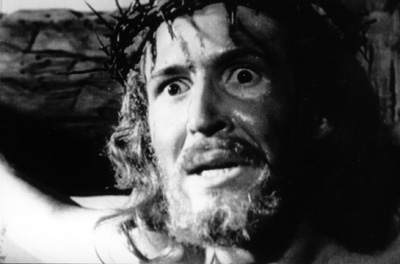

2000, USA, 16mm, b/w & colour, sound, 18 min.
King of the Jews is a film about fear and transcendence. Utilizing Hollywood movies, 1950's educational films, personal home movies and religious films spanning the history of cinema, the filmmaker depicts his childhood fear of Jesus Christ. These childhood recollections are a point of departure for larger issues, including the roots of Christian anti-Semitism and the need for forgiveness and healing.
King of the Jews is divided into three sections, each one a genre in itself. The first section (Jesus and Me) is a narrative evocation of growing up as a Jewish boy in the late 1950's in Brooklyn and my first confrontations with Jesus and the feelings of being an outsider. The images consist of home movies shot by my father inter-cut with super 8 images of New York and found footage imagery from 1950's educational films.
The second section (One of Us) follows more of a documentary format. It explores the roots of Christian anti-Semitism, examining the historical Jesus and uncovering the distortions in the early Christian gospels.
The third section (The Light Is All About Us) is experimental and lyrical. It brings the viewer into a spiritual, almost trance-like space, a place to reflect on one's own religious beliefs and the alternate feelings of alienation and inclusion we all experience.
My transformation from childhood fear of Jesus to adult appreciation for his teachings was the catalyst for this film. King of the Jews explores the challenges and fears of being an outsider, of holding beliefs different from the mainstream. The myth that "the Jews killed Jesus has been responsible for centuries of pain and destruction. After 2000 years, the wound is still open. The film uses the resurrection of Christ as a metaphor for personal renewal. Only by acknowledging and healing past injustices can we get closer to our shared humanity.
Jay Rosenblatt
